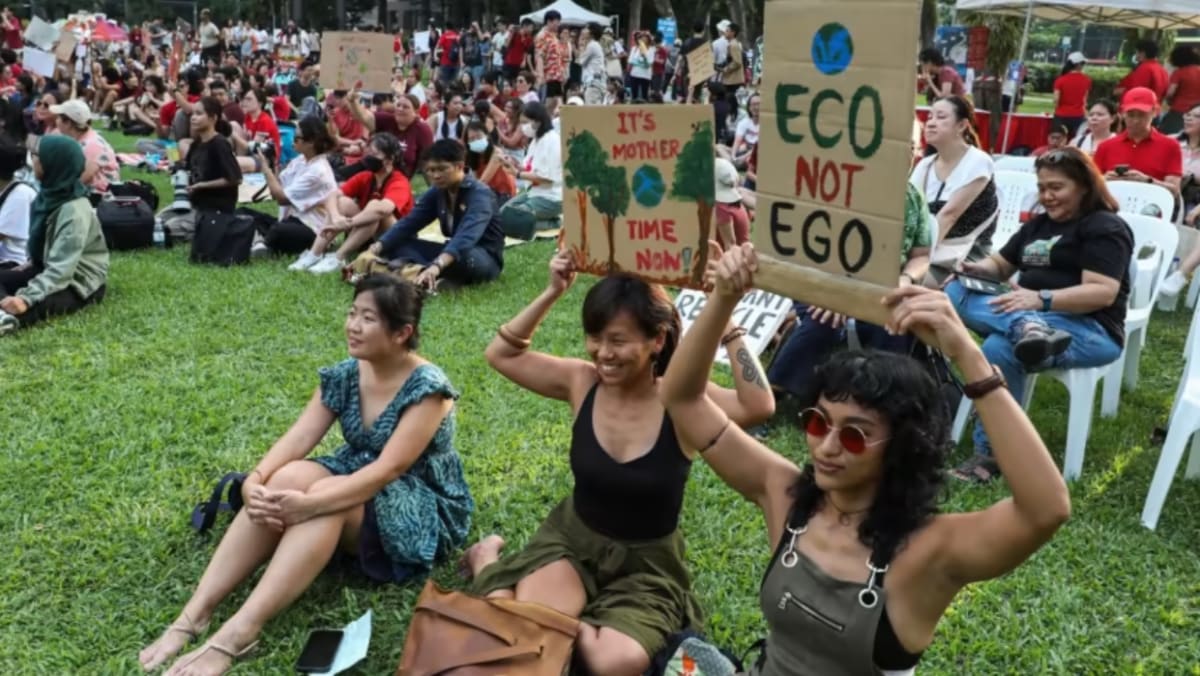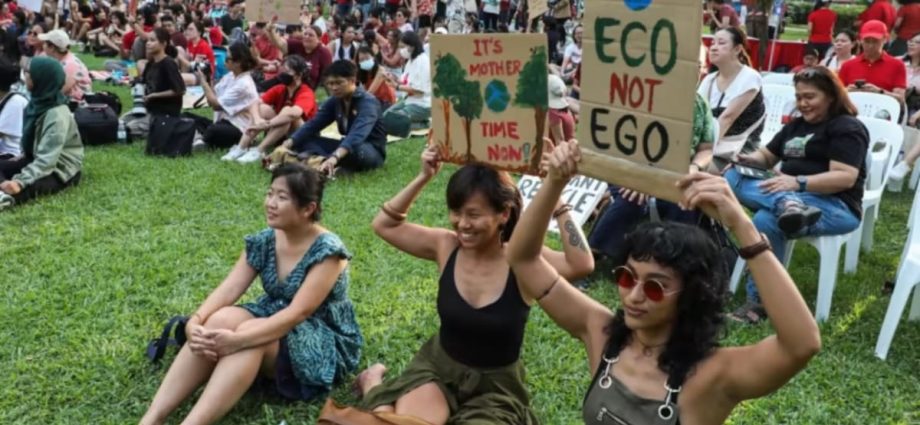
SINGAPORE: Ms Marlina Yased, 45, a mother of five who lives in a two-room rental flat in Lengkok Bahru for 13 years has never considered herself much of an activist.
But after receiving rousing applause from more than 1,400 attendees after her speech at the SG Climate Rally this year, she understood how her voice can be “strong” and be used to deliver a “powerful message”.
Addressing the crowd, Ms Marlina said: “As the climate crisis worsens, we must not give up. We must understand that we, the people also have the power to make change.”
Ms Marlina was speaking at the first SG Climate Rally held at Hong Lim Park since the Covid-19 pandemic on Saturday (Sept 23) evening.
The other speakers were former Nominated Member of Parliament Geh Min, sustainability strategist and researcher Madhu Ardhanari, co-founder of LepakInSG Ho Xiang Tian and Nor Syazwan Abdul Majid, who founded Wan’s Ubin Journal.
Speakers at the rally, in line with the theme of inclusiveness, emphasised how the impact of the climate crisis is distributed unequally with lower-income residents disproportionately bearing the negative impacts of climate change.
For Ms Marlina, it is clear how climate change affects her daily life — the heat in her flat has become increasingly unbearable and air-conditioning units, even portable ones, are considered a “luxury” for her family.
The community worker said that the heat adds not only to her stress at work but poses financial stresses as higher temperatures lead to increased water consumption, risk of skin diseases and doctor’s visits.
Mr Syazwan, who runs the social platform Wan’s Ubin Journal, spoke about emphasising the importance of including indigenous voices and history in policy planning and education of climate change.
Drawing on his experience of learning his heritage as a descendant of the Ubin Orang Pulau from his mother, Mr Syazwan said: “The Orang Pulau were champions of sustainability. They understood what nature provided for them and the symbiotic relationship between humans and nature.”
Rally organiser Kristian-Marc James Paul said that advocating for climate justice means also being aware that climate change and the ways we tackle this issue is “fundamentally related” to other “bread and butter issues”.
Besides speeches, environmental groups such as Students for a Fossil Free Future and the People’s Movement to Stop Haze (PM.Haze), as well as civil society groups, such as Migrant Mutual Aid and Workers Make Possible, set up community booths to raise awareness about their causes.
One activity available at the booths allowed participants to write postcards to MPs about the various concerns and suggestions that they had about climate change. By the end of the rally, about 300 postcards had been submitted.
Mr Ho from LepakInSg, an environmental group, said that systemic change cannot be done alone and that the work of raising awareness included tedious tasks like reading reports and writing feedback.
While individuals might feel jaded and powerless alone, Mr Ho said that the rally was a good reminder that while individuals “cannot make a difference alone”, in a community, they could.
Ms Nur Hazeerah Mohamed Basri, 29, a freelance fashion designer, agreed that being able to attend the rally in-person was heartening because she met other people who felt strongly about the environment and now feels less “alone”.
“Even if they might think about things in a different way, they still have the same end goal, and I think it’s really cool to build community as we go through this together,” said Ms Nur who uses sustainable materials and practices in her craft since learning about waste in the fashion industry.
Spotted in the crowd was People’s Action Party’s MP Wan Rizal, who said that he looked forward to receiving postcards from his Jalan Besar residents as they would “know the environment best”.
He added he had also penned a postcard to his own MP about protecting the green spaces in his Pasir Ris neighbourhood.
Opposition MPs from the Workers’ Party He Ting Ru, Dennis Tan, Louis Chua, Gerald Giam and Jamus Lim were in attendance, as well as Progress Singapore Party Non-Constituency MP Leong Mun Wai and Red Dot United’s secretary-general Ravi Philemon.
WHY SINGAPOREANS DON’T SEE CLIMATE CHANGE AS URGENT
The Southeast Asia Climate Outlook Survey Report 2023, which was published on Thursday by the Iseas-Yusof Ishak Institute, showed that climate advocacy in Singapore is lower than in other countries in the region.
Only 43.7 per cent of Singaporeans polled believe that climate change “is a serious and immediate threat to the well-being of the country”, a significant drop from 66.4 per cent in 2021, but a slight increase from 40.5 per cent in 2022.
The survey showed that fewer Singaporeans took steps to sign climate change related petitions (17.6 per cent) and attend protests (3.2 per cent) compared to Asean’s average of 18.2 per cent and 4.3 per cent respectively.
When asked about why Singaporeans seem to view climate change as much less of an urgent issue as compared to our neighbours, Mr Paul said discussing climate change may not be a “muscle” that Singaporeans commonly use, but that the rally hopes to be a space to start conversations about climate change and how it affects society in uneven ways.
Hoping that climate awareness would become less of a “niche” issue, Ms Ardhanari said that while a small group of Singaporeans may have a “high level of awareness”, overall climate awareness in Singapore has not caught up to the scale and nature of impact of climate change.
She added that Singaporeans could no longer afford to remain in “echo chambers” around climate change.
“This is something that affects all of us, but it seems like the people who want to talk about is a very small group of people, and are often disconnected with people who are facing the most of who are most vulnerable to impact.”

